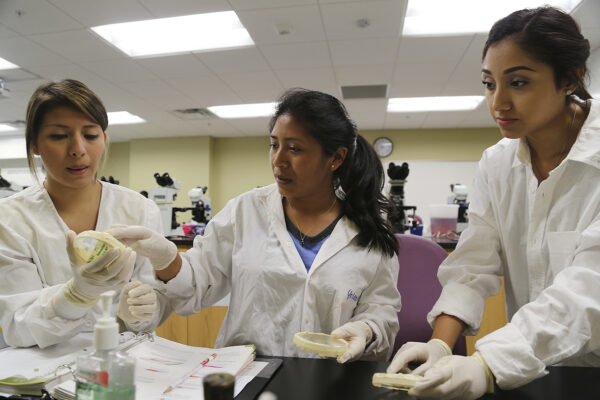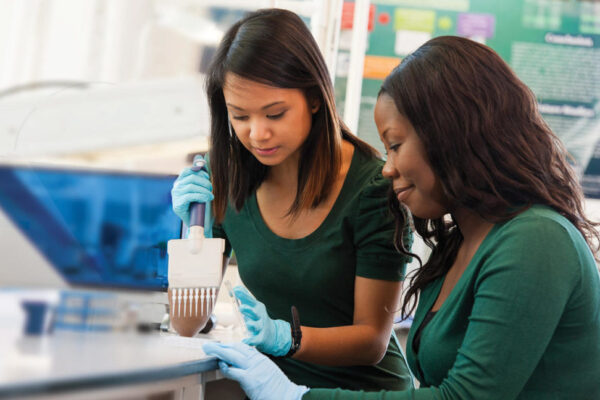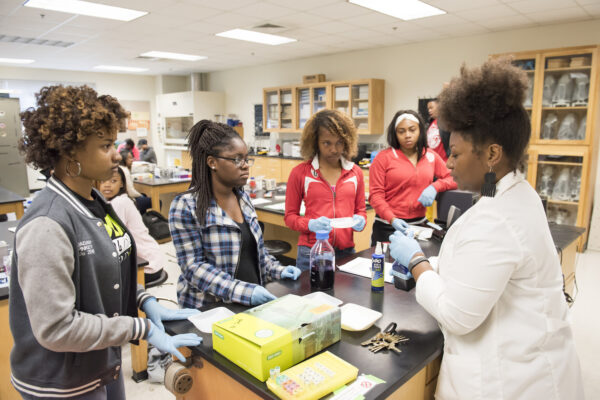By Tabbye Chavous, Seanna Leath, and Raúl Gámez
This post is the sixth in a series on campus climate and STEM success. ACE is partnering with the National Center for Institutional Diversity at University of Michigan on the series.
In scholarship and popular discourse, explanations for the underrepresentation of African Americans, Latino/a/x, and Native Americans in doctoral education in science, technology, engineering, and mathematics (STEM) disciplines tend to focus on student characteristics (e.g., socioeconomic status, academic preparation) and are usually framed in terms of deficits, or what these students “lack.” However, socioeconomic and academic background factors do not fully explain the underrepresentation of these racial/ethnic groups among STEM doctoral degree recipients. While demographic background matters, social, psychological, and structural dimensions also influence individual achievement and persistence.
Research shows that students’ contextual experiences influence their academic identity—that is, how students think about themselves as learners and members of their disciplines and how they develop affective connections and engage within their disciplinary contexts. Maintaining a strong, positive academic identity is an important developmental task for all students and is critical for sustained engagement and persistence. For underrepresented racial/ethnic minority (URM) students in higher education, race-related experiences can undermine or promote academic identity and subsequent adjustment and participation in STEM in unique ways.
Along with their numerical underrepresentation in STEM, URM students are also particularly likely to encounter racially stigmatizing experiences—discrimination, stereotype-based treatment, or negative racial climates—in daily academic contexts. Such experiences can have a negative impact on individuals’ academic identities and undermine achievement, even among those with strong academic backgrounds and commitments. That is, individuals may come to believe that those contexts are incompatible with their personal identities and psychologically “dis-identify,” or disengage their personal identities from their academic contexts, resulting in less interest and effort. Students who think they will experience discrimination or bias may also come to view those contexts as having limited value for their future professional or occupational pursuits. As a result, stigmatizing experiences can inhibit academic identity and lead talented students to opt out of STEM pursuits or graduate education altogether.
On the other hand, affirming experiences, like quality mentoring, signal that students belong to an inclusive community and can reinforce and enhance students’ academic identities in ways that lead to achievement and continued participation in their field. Mentoring relationships—especially those with faculty, academic advisors, and research supervisors—are critical to student success in doctoral education. However, graduate students of color often receive inadequate support from faculty advisors, including exclusion from research opportunities and treatment and feedback based on low expectations. In addition, low faculty diversity in STEM, leaves URM students with few significant opportunities to connect with same-race mentors.
Focusing on contextual experiences represents an important shift away from historical approaches of explaining URM STEM under-participation that emphasize students’ academic or cultural deficiencies. In that spirit, our work with the National Center for Institutional Diversity (NCID) also considers how individual strengths and assets that URM students bring to their disciplinary contexts—particularly those related to students’ racial and cultural identities—can promote student resilience, that is, help them maintain strong academic identities in the face of stigmatizing experiences.

URM Student Experience and STEM Persistence
A study from the Michigan Alliance for Graduate Education for the Professoriate (AGEP) [1] focuses on two key questions to better understand URM student experience and persistence in STEM. More specifically: How are URM students’ stigmatizing climate experiences in their departments/programs related to their academic identity and STEM persistence outcomes? and What affirming experiences and supports promote students’ academic identity and STEM persistence outcomes?
Below, we highlight key themes from the project, including implications for the success of underrepresented racial/ethnic minority students in STEM.
Racial Climate and Microaggressions
“Students have openly expressed to me that even though I may have worked hard to get here, there is still a number of people who believe that I got here because of affirmative action. A faculty member said to me that based on the amount of work the University is putting in to improve diversity, he is surprised that they didn’t just openly offer me a faculty position; instead of requiring a post-doctoral fellow position. In my personal work area, I am laughed at on a daily basis about the way I talk . . .”
Study findings show that students who initially reporting a less equitable and non-inclusive racial climate reported more negative academic identity outcomes as time went on, including lower sense of belonging in the program, lower departmental trust, and lower academic efficacy after a year of graduate school. Similarly, students who reported more frequent microaggressions (e.g., insults, incivility, stereotype-based treatment) later reported lower departmental trust, identification with the discipline, and intellectual engagement. Students experiencing a more negative racial equity climate also reported more academic struggles a year later, but a higher interest in future faculty research careers. These findings highlight the harmful impact of stigmatizing experiences and suggest that experiencing inclusion can promote academic motivation and engagement. It can also be said that for some URM students, encountering race-related challenges may motivate them to persist in hopes of changing the academic and institutional climate as future faculty.
Mentoring
“Not a single faculty of my ethnic background within my department. Often people who share ethnic backgrounds communicate better, understand each other and can concentrate on work rather than working through cultural differences. The option of working with someone of my background is not even an option for me . . .”
The findings also suggest that more supportive mentoring experiences (i.e., based in high expectations, with critical feedback) can result in a stronger sense of belonging in the program and higher academic efficacy and departmental trust. Students who maintained a strong interest in university careers over time were more likely to have a same-race mentor in their department compared to students whose interest in those careers decreased. [Interestingly, having a same-race mentor outside their department was not related to URM students’ faculty career interests, but URM students were more likely than non-URM students to report having to find a mentor outside of their department.] This suggests the unique benefits of URM students having available mentors from same racial backgrounds within their departments and fields of study for enhancing the pipelines in those fields. Our results also indicated that climate and mentoring were particularly influential on academic identity outcomes for students at earlier stages (pre-candidates), and on career interests for later stage students (candidates) when students are developing independent interests and crystallizing their professional identities and related goals.
Cultural Identity as Promotive and Resilience Factors
“The support of my family…has been the most important support that I have in my graduate success. Also, having a very supportive advisor who is a caring woman of color with high expectations for my professional development has made me training all the better.”
Students reporting a stronger sense of racial group connectedness (racial centrality) reported less struggle to meet the academic standards in their program a year later. Students with stronger racial centrality also were more resilient in the face of negative racial climate and microaggressions experiences; that is, these students’ academic identity outcomes (such as sense of belonging and department trust) were less negatively affected by these experiences than for students with weaker racial centrality. Similarly, among students who perceived a more negative racial climate, reporting stronger racial centrality and more support from their cultural communities related to increasing or maintaining interest in future faculty careers. These findings suggest that racial identity and cultural community support serve as cultural assets, promoting STEM persistence and supporting resilience in the face of stigmatizing experiences in STEM.
Implications and Conclusions
For URM students who continue to experience racially stigmatizing environments in STEM, these experiences can be detrimental to their academic identity and their academic adjustment and persistence. Institutional efforts to increase demographic diversity in STEM through recruitment of URM students are not sufficient to enhance STEM success. Rather, these efforts must be accompanied by actions that create equitable and inclusive contexts in which students can thrive and see themselves as welcomed and successful in their discipline. In taking such actions, attention to mentoring is critical—including recruiting URM faculty and professional development supports and for all faculty to engage in high-quality mentoring practices with students from diverse backgrounds.
Institutions should move away from traditional “colorblind” approaches to supporting URM student success in STEM toward approaches in which diversity is seen as an asset to the work of the discipline rather than a deficit. Students’ connections to their racial and cultural identities and communities support their progress and promote sustained interest in STEM research careers. As such, institutional practices and programming should encourage students to connect their personal and cultural identities to their academic contexts and create spaces of community and identity affirmation.
Finally, findings from our work suggest some students may respond to negative climates by increasing their disciplinary identity and motivation to pursue faculty and research careers as a means of creating better opportunities for the next generation. Further exploration of such career interest factors could help inform programming and career advising to enhance URM faculty/research pipelines. In doing so, it would be critical to consider ways to support these scholars in developing strategies for being change agents that also support their successful scholarly/professional advancement.
[1] We examined longitudinal survey data collected from URM doctoral students (self-identified Black/African American, Latino/a/x, and Native American students) (N=507) from five public research institutions participating in the Michigan Alliance for Graduate Education for the Professoriate (AGEP). AGEP is a National Science Foundation program that seeks to increase URM PhD completion and attainment of faculty/research careers in STEM. Students were surveyed over a two-year period. Wave 1 was collected in Winter/Spring 2015 and Wave 2 data was collected one year later in Winter/Spring 2016.
If you have any questions or comments about this blog post, please contact us.


